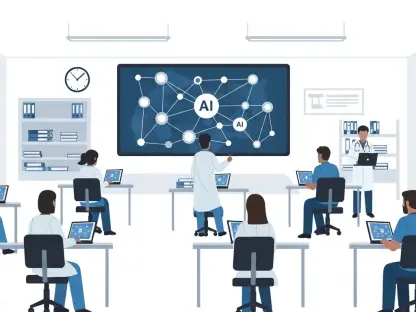I’m thrilled to sit down with Faisal Zain, a renowned healthcare expert with a deep background in medical technology. With years of experience in the manufacturing of medical devices for diagnostics and treatment, Faisal has been at the forefront of driving innovation in healthcare. Today, we’re diving into the transformative role of AI in clinical workflows, particularly how it supports nurses and clinicians by streamlining repetitive tasks, enhancing patient care, and reducing burnout. Our conversation explores the real-world impact of AI on clinical abstraction, the importance of designing tools with clinician input, and the future of technology in empowering healthcare professionals.
Can you start by explaining what clinical abstraction is and why it’s so critical for nurses in healthcare settings?
Clinical abstraction is the process of extracting specific data from electronic health records (EHRs) or other medical documentation to support quality reporting, registry submissions, and clinical decision-making. For nurses, especially nurse abstractors, this often involves sifting through complex records to identify relevant details, like patient outcomes or treatment specifics, in specialties such as cardiology or neurology. It’s critical because this data drives quality improvement initiatives and ensures compliance with regulatory standards. Without accurate abstraction, hospitals can’t effectively measure performance or identify care gaps, which directly impacts patient care quality.
How does AI manage to reduce abstraction time by as much as 80%, and what does that look like in a practical scenario?
AI achieves this by automating the repetitive, manual aspects of abstraction. For instance, instead of a nurse spending hours searching through EHRs for specific data points, AI algorithms can scan records, identify relevant information, and even auto-populate registry fields. In a real-world scenario, imagine a nurse working on a cardiology registry submission. What used to take five hours of manual data extraction might now take just one hour, with AI flagging key details like procedure outcomes or complications. This time saving means nurses can handle more cases or shift focus to direct patient care and strategic initiatives.
In what ways does AI help nurses move away from repetitive tasks toward more meaningful, high-value work?
AI takes over the grunt work—like copying data between systems or hunting for scattered information—and frees nurses to focus on tasks that require their expertise. For example, instead of spending a day on data entry, a nurse might analyze abstracted data to spot trends or validate its accuracy for quality improvement. This shift transforms their role from clerical to strategic, allowing them to contribute more directly to better care protocols and patient outcomes, which is far more rewarding.
There’s a common concern that AI could replace human roles in healthcare. How do you address this fear, especially for nurses?
I understand the concern, but AI isn’t about replacing nurses—it’s about amplifying their impact. Nurses bring irreplaceable skills like intuition, empathy, and critical thinking to the table, which no algorithm can replicate. AI should be seen as a supportive tool, handling mundane tasks like retrieving legacy data or flagging documentation gaps, so nurses can focus on complex cases and patient interaction. The key is to position AI as a partner, ensuring it’s implemented in a way that enhances, not diminishes, the human element in care.
You’ve stressed that AI tools should be built with nurses, not just for them. Can you unpack what that means in practice?
It means involving nurses from the very start of AI tool development, not just as end-users but as active contributors. Their insights into daily workflows, pain points, and patient needs are invaluable for designing systems that truly help. For instance, nurses can provide feedback on how an AI interface should look or what data points are most critical to surface. Without this input, you risk creating tools that feel clunky or irrelevant, which can frustrate rather than support clinical staff.
Many nurses have faced tech rollouts that promised efficiency but ended up adding more work. How can AI avoid falling into this trap?
The difference lies in seamless integration. AI needs to be embedded directly into existing workflows, not tacked on as an extra step. For a nurse, this might mean AI highlighting relevant data within the EHR they’re already using, or auto-suggesting registry entries without requiring separate logins or systems. The goal is to make AI a background partner—reducing clicks, minimizing manual input, and ensuring it doesn’t introduce complexity or extra mental load.
Can you share a real-world example where AI has made a tangible difference for a nurse or clinical team in focusing on patient care?
Absolutely. I’ve seen a case in a mid-sized hospital where nurse abstractors were overwhelmed with registry submissions for a neurology department. Before AI, they spent most of their shifts manually pulling data, leaving little time for quality analysis. After implementing an AI tool that automated data extraction and flagged inconsistencies, their abstraction time dropped significantly. This allowed the team to dedicate hours to identifying care gaps, like missed follow-ups, and work with providers to address them. The result was improved patient follow-up rates and a noticeable boost in team morale.
How does AI contribute to reducing burnout and improving staff satisfaction among nurses?
Burnout often stems from endless administrative tasks that drain energy and detract from patient interaction. AI lightens this load by automating repetitive work like data abstraction or cross-checking records. When nurses spend less time on tedious tasks and more on meaningful work—like direct care or quality improvement—they feel a greater sense of purpose. This shift not only reduces stress but also fosters a more fulfilling work environment, which is crucial for retention and satisfaction.
Looking ahead, what is your forecast for the role of AI in clinical workflows over the next decade?
I believe AI will become an even more integral part of clinical workflows, evolving from a supportive tool to a core component of healthcare delivery. Over the next decade, I expect AI to get smarter at predicting care needs, personalizing workflows for individual clinicians, and integrating across diverse systems with even greater seamlessness. But its success will hinge on keeping clinicians at the center—ensuring AI continues to empower nurses and doctors rather than complicate their roles. We’ll see a future where technology and human expertise work in perfect harmony to drive better outcomes for patients and providers alike.









